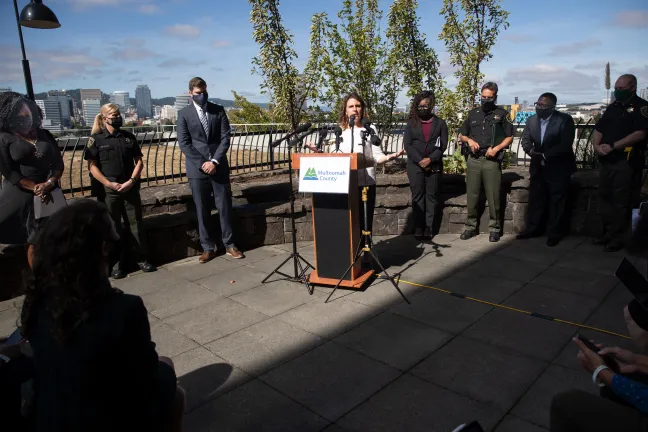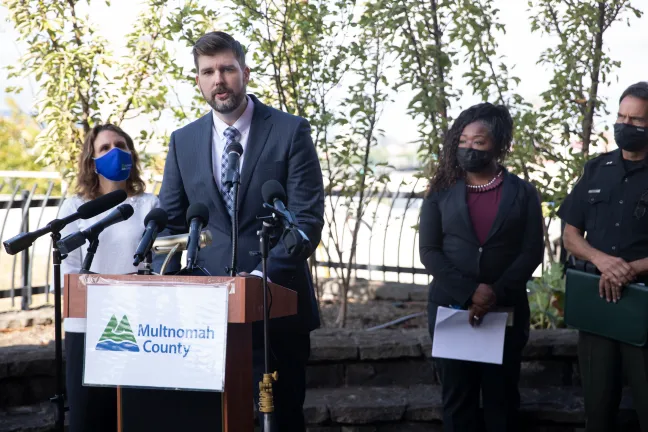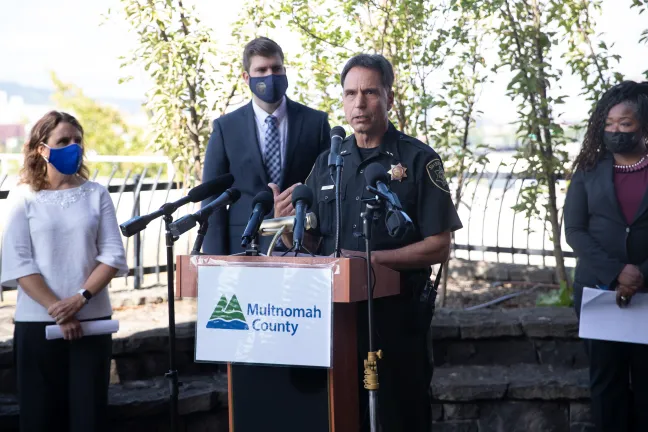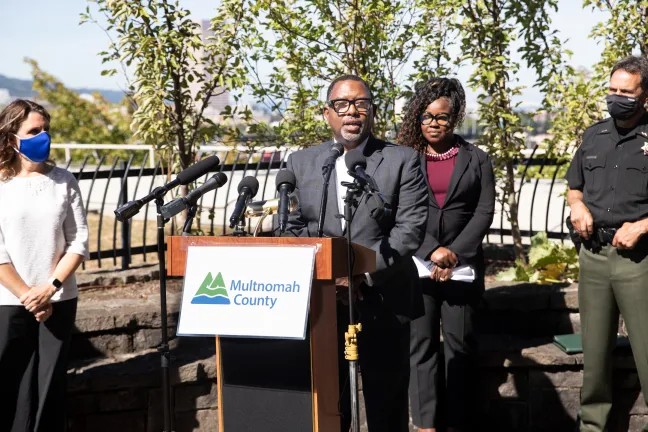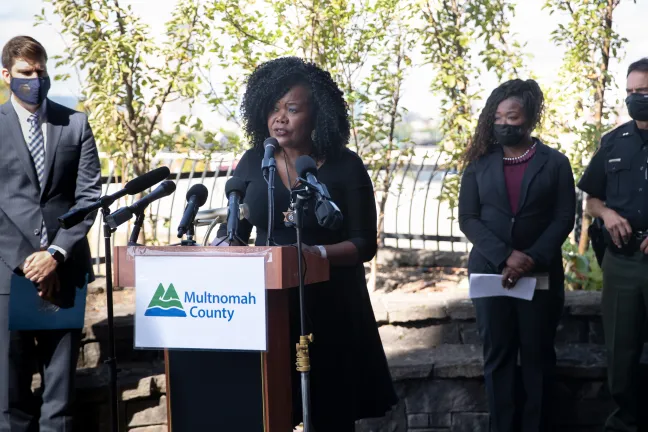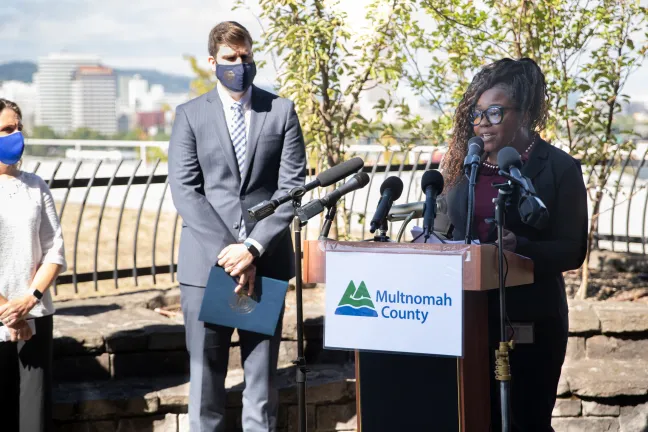Watch full press conference here.
In recognition of an urgent need for action, Multnomah County leaders today announced new hires, investments and collaboration — including new prosecutors, and expanded community partnerships and health programs — to speed the prosecution of gun homicide cases and reduce community violence.Chair Deborah Kafoury, District Attorney Mike Schmidt, Sheriff Mike Reese, Department of Community Justice Director Erika Preuitt and Health Department Director Ebony Clarke stood with Joe McFerrin II, POIC + Rosemary Anderson High School CEO and president, and outlined efforts to fight the devastating rise in gun violence across the County.
Gun violence has increased dramatically in Multnomah County and the nation over the last year. This last Tuesday, Sept. 21, the Portland Police Bureau reported seven shootings in just one day. While the County DA, Sheriff and Department of Community Justice (DCJ) are redoubling efforts and coordination to reduce gun violence through intervention and accountability, the Health Department and community partners have increased prevention and wrap-around services to increase public safety and community health.
“COVID-19 has disrupted our routines, our behavioral health, and our public spaces, and guns have made that disruption deadly,’’ said Chair Kafoury. “The problem is great, and we are here today to demonstrate how Multnomah County is responding to that challenge, and moving forward urgently, holistically and in close coordination.’’
DA adds prosecutors to speed cases
Multnomah County District Attorney Mike Schmidt has assigned his most experienced prosecutors to the toughest homicide cases and is working with Chair Kafoury to secure $1 million in funding to bring on two new investigators and four new attorneys to add capacity to homicide investigations and prosecutions.
Every time there’s a homicide, a prosecutor arrives on the scene, day or night, to be with victims' loved ones in the worst moment of their lives while building the case from the ground up. This requires tremendous time and resources. The announcement to add prosecutors came a week after the DA released a new dashboard showing an incredible increase in firearms-related prosecutions over the last three years.
“Amidst a gun violence epidemic and debilitating backlog in the courts due to the COVID-19 pandemic, which remains an imminent threat to our community, new ground must be broken through strategic investments,’’ said Schmidt. “In this moment of urgency we must not go backward to the tough-on-crime era policies that seeded where we are today, hollowing out families and creating cycles of poverty and oppression. Instead, County leaders are rising to this challenge with a collaborative, modernized, evidence-based approach.”
Collaboration, prevention and intervention focus of Sheriff’s Office
Over the last year, Multnomah County Sheriff Mike Reese has laid the foundation for a stronger collaboration between the Gresham Police Department, Department of Community Justice, the City of Portland’s Office of Violence Prevention, Healing Hurt People, the District Attorney’s Office and the FBI. This group’s approach is based on prevention and intervention. This collaboration allows for better information-sharing and defines roles of each organization, as we all do our part to respond to gun violence. The Sheriff’s Office has remained focused on investigations involving firearms, reducing the number of illegal firearms in our communities, and maintaining a visible presence in areas where shootings have occurred. The agency also participates on the FBI’s Metro Safe Streets Task Force with regional public safety partners to hold accountable the people engaged in gun violence and those illegally supplying firearms to criminals.
These focused interventions are actively removing firearms from our communities. Since the beginning of the year, deputies have confiscated 719 firearms, a marked increase over prior years, up from 319 in 2020 and 267 in 2019. Specifically, this summer, deputies assigned to the Special Investigations Unit recovered 337 weapons from a metro-area residence, the largest single cache in agency history. Illegal firearms never go back on the street; they are melted and destroyed.
“By removing firearms from the equation, we reduce the likelihood of a lethal outcome, and keep guns out of the hands of those who pose the greatest risk,” Sheriff Reese said. “I am committed to creating communities that are safe and welcoming for everyone. I believe that public safety is the foundation for healthy, thriving communities where we can raise our families and grow a business.”
Community leaders partnering on solutions
Joe McFerrin II, POIC + Rosemary Anderson High School CEO and president, said increasing capacity in community-based organizations — organizations that made a difference reducing gun violence decades ago but saw funding decrease as violence decreased — will help turn the tide again.
The Public Safety Village, a consortium of Black-led organizations led by individuals who have been impacted by or involved in community violence, is already deployed in the community. The Village helps fill local gaps in violence intervention services by providing cognitive-behavioral therapy, conflict resolution, recreation opportunities, youth grief/loss support groups, decision-making skill-building, and more.
“Those closest to the problem are closest to the solution,” McFerrin says. “Addressing the gun violence crisis will take input — and action — from our community and those with lived experience. The Village is working in partnership to find solutions.”
Community Justice working with partners, data
County leaders are leveraging data to apply a 21st century, evidence-based approach to the County’s gun crisis, including prevention, intervention, suppression and rehabilitation.
“As the director and a 27-year veteran of this department, I’ve not only seen the toll violence takes on our community,’’ said Erika Preuitt, director of the Department of Community Justice. “I’ve seen it as someone who’s worked with high-risk clients and their families, as a probation and parole officer.”
Multnomah County’s Department of Community Justice, alongside criminal justice partners, are working on plans for call-ins to respond to gun violence. These targeted virtual public announcements will be dispersed to people on Community Justice caseloads engaged in unsafe behavior. They will relay a message that this level of violence is not acceptable and will lead to consequences. And it will also educate about services and support available.
"Our community is in an all hands on deck moment, calling for leadership, collaboration, unity and strategic investments."
Violence as a public health crisis
Health Department Director Ebony Clarke said the County is directing more than $2.8 million to upstream public and behavioral health programs to address the root causes of violence.
“We're applying a public health approach to violence prevention,” said Clarke. “We know that gun violence disproportionately impacts communities of color. And we are working to not only prevent that but also to address the impacts of trauma, both generational and recent, for survivors, for people involved in the criminal legal system, and for families and community members.’’
Violence is often concentrated in communities with higher rates of poverty, lower incomes, higher health disparities, higher eviction rates and fewer economic opportunities for residents.
That’s why it’s so important to push forward anti-poverty initiatives, emergency housing, trauma-informed therapy and drug treatment, school-based services, hunger relief, and access to healthcare clinics, she said.
Community health specialists, who provide families with safety plans and trauma support, are now part of the continuum of services. Community health specialists from the Health Department serve within the Department of Community Justice’s Women and Family Services Unit. They focus on the social determinants of someone’s health. They also look at the factors influencing a person’s economic stability, their access to food and healthcare.
"They’re looking at that person’s support systems and their environment. They’re focusing on families and helping parents navigate complex systems while providing them with resources to help their families thrive,'' she said
#####
